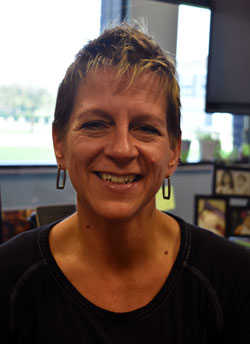Some students may get into trouble more easily than others, especially if they’re minorities singled out by educator bias.
A 2018 report shows black students are disciplined at higher rates than white classmates, and that students with disabilities also are suspended or arrested disproportionately to their enrollment numbers. Studies show as well that students with disciplinary problems get poorer grades and drop out more often.
It doesn’t have to be that way, according to researchers with the Michigan Integrated Behavior and Learning Support Initiative (MBLSI), a statewide research project.
Related story: State program to fight racial bias in school discipline is moving ahead despite federal pushback
Using Positive Behaviorial and Intervention Supports (PBIS), educators can reduce racial inequities and make their schools safer places in which more learning occurs, according to researchers. A program used by several Kent ISD schools, PBIS aims to curtail negative behaviors by rewarding positive ones.
Beth Hill, an equity coach with MIBLSI, is studying how teachers and administrators can use PBIS to improve their response to “vulnerable decision points,” or disruptions that lead to discipline situations.
‘What’s the best way to put out a fire? It’s not with more fire.’ — equity coach Beth Hill
Based at Kent ISD’s offices, Hill has been gathering discipline data from two schools, including one in Kent County, as part of the pilot program. The other school is in the Port Huron Public School District.
During the past several months, Hill has been looking at disciplinary records and meeting with teachers and administrators to learn how they handle discipline.
At this stage in their research, Hill says their team is poring over disciplinary records and interviewing teachers and administrators to determine what practices work and how bias plays a role in school discipline.

Slowing Down Automatic Responses
Hill also coaches teachers and administrators in how to use PBIS to curtail negative behaviors and encourage positive ones.
For example, PBIS may mean that a teacher slows down his or her reaction and automatic response when a student misbehaves or acts out, says Hill. “What’s the best way to put out a fire? It’s not with more fire,” Hill says.
The results can be dramatic. Using PBIS methods, the staff at one of the Michigan pilot schools in Port Huron reduced overall Office Discipline Referrals (ODRs) from 4,321 in 2016-2017 to 2,473 ODRs in 2017-2018 — almost a 43 percent decline.
Confronted with disruptive students, a teacher may need to take a moment to reflect on their own response and whether it’s colored by their biases.
Teachers who can understand their own feelings and focus on the student’s needs are likely to respond more fairly and equitably, Hill says.
Students also are likely to respond more positively when they believe the punishment being handed out is fair and equitable, she says.
“We focus on things you can do,” Hill says. “It really comes down to the relationships and connections you make.”
Hill and her team also focus on the need for cultural responsiveness to a diverse group of students. That includes examining whether educators have an understanding of their own biases and expectations of their student, Hill says.
For example, white students may be held to higher expectations than minority students by teachers who make assumptions about the minority students’ desire to achieve in the classroom.
“It’s becoming aware of your system,” Hill says. “We want it to be uniform and fair for all.”
Seeing Problem on the Ground
It’s an issue Hill saw firsthand early in her career, when she put herself through graduate school while working as a security guard at the former Grand Rapids Central High School in the late 1990s.
“As I was working with the kids, people were making comments to me – ‘You’re going to get shot. There’s crime’ — and that kind of stuff,” says Hill.
What Hill saw in the diverse student body were kids trying to succeed while staying out of trouble. But she also saw minority students ending up on the wrong side of the disciplinary system more often than white students.
Black students complained about white teachers who treated them more harshly than they did white students for the same offenses, says Hill. Minority students also says they were being held to lower standards, thus earning lower grades than their white counterparts, she says.
“As I was working at the school and getting to know the kids and hearing their voices and their experiences, I realized the adversity they were facing was above and beyond what I ever experienced as a white female in high school,” says Hill, who went on to earn a master’s degree in social work.
Hill emphasized their goal is not to blame teachers for the inequities that can occur in school discipline.
“We know that training isn’t going to do anything if I make you feel bad or make you upset,” she says. “It’s a hard job, it’s emotionally draining.
“That’s why we focus on what we can do at those vulnerable decision points. What it really comes down to — as an adult in that spot – is relationships and connections.
“Then, when you have to have those hard conversations, it’s coming from a spot where they know you care and it’s not just another person who doesn’t care.”
CONNECT
Learn more about PBIS in Michigan
Racial disparities in school discipline are growing, federal data show









